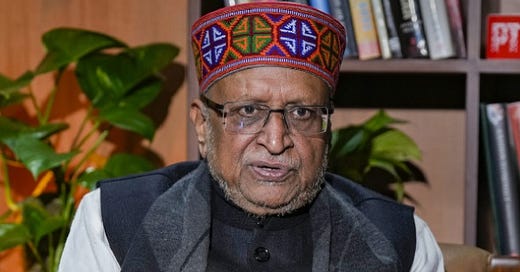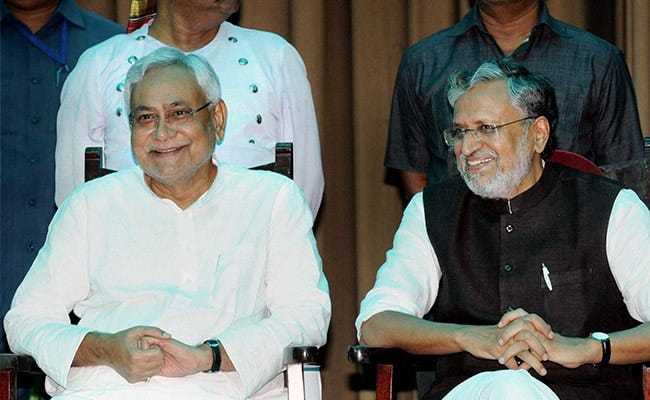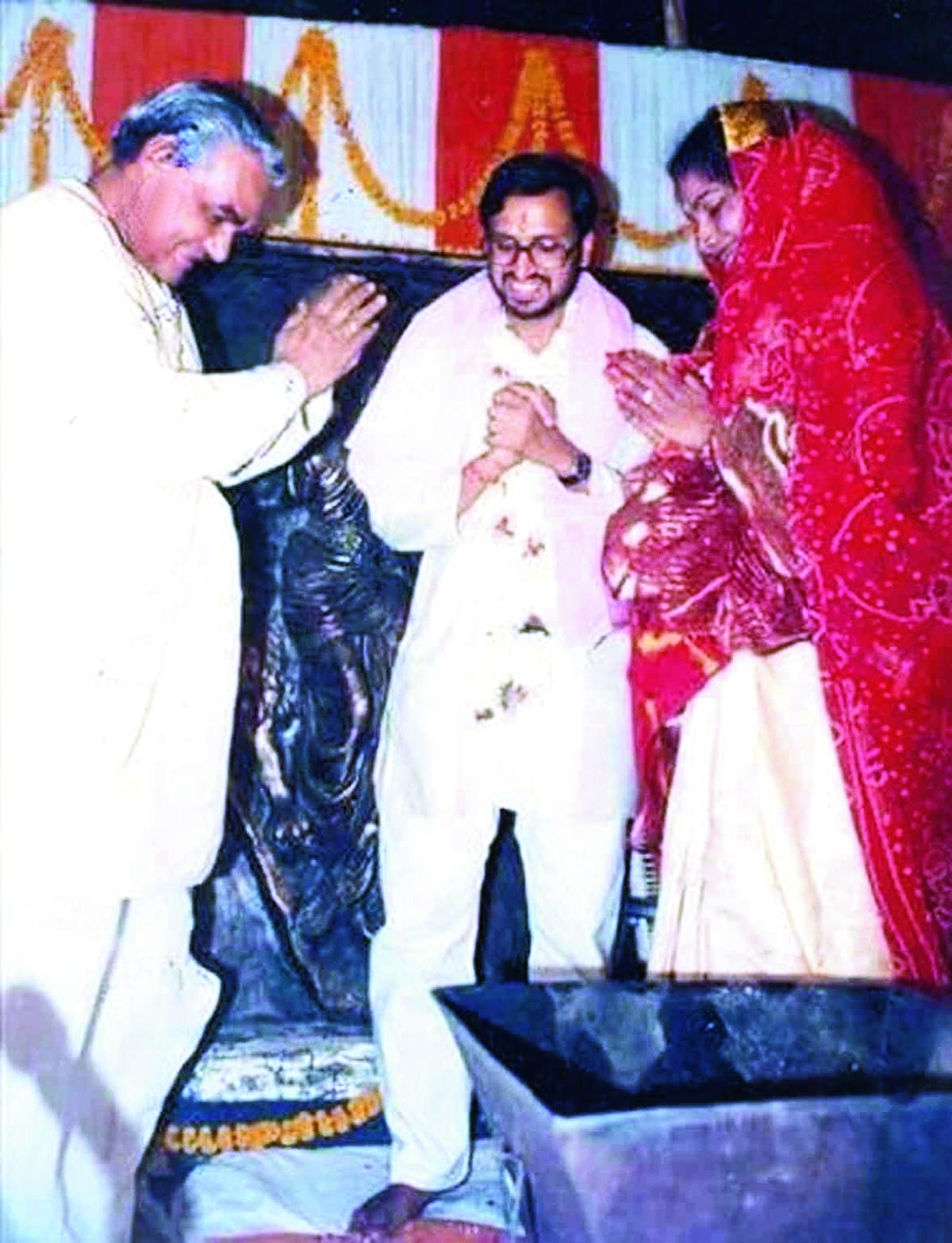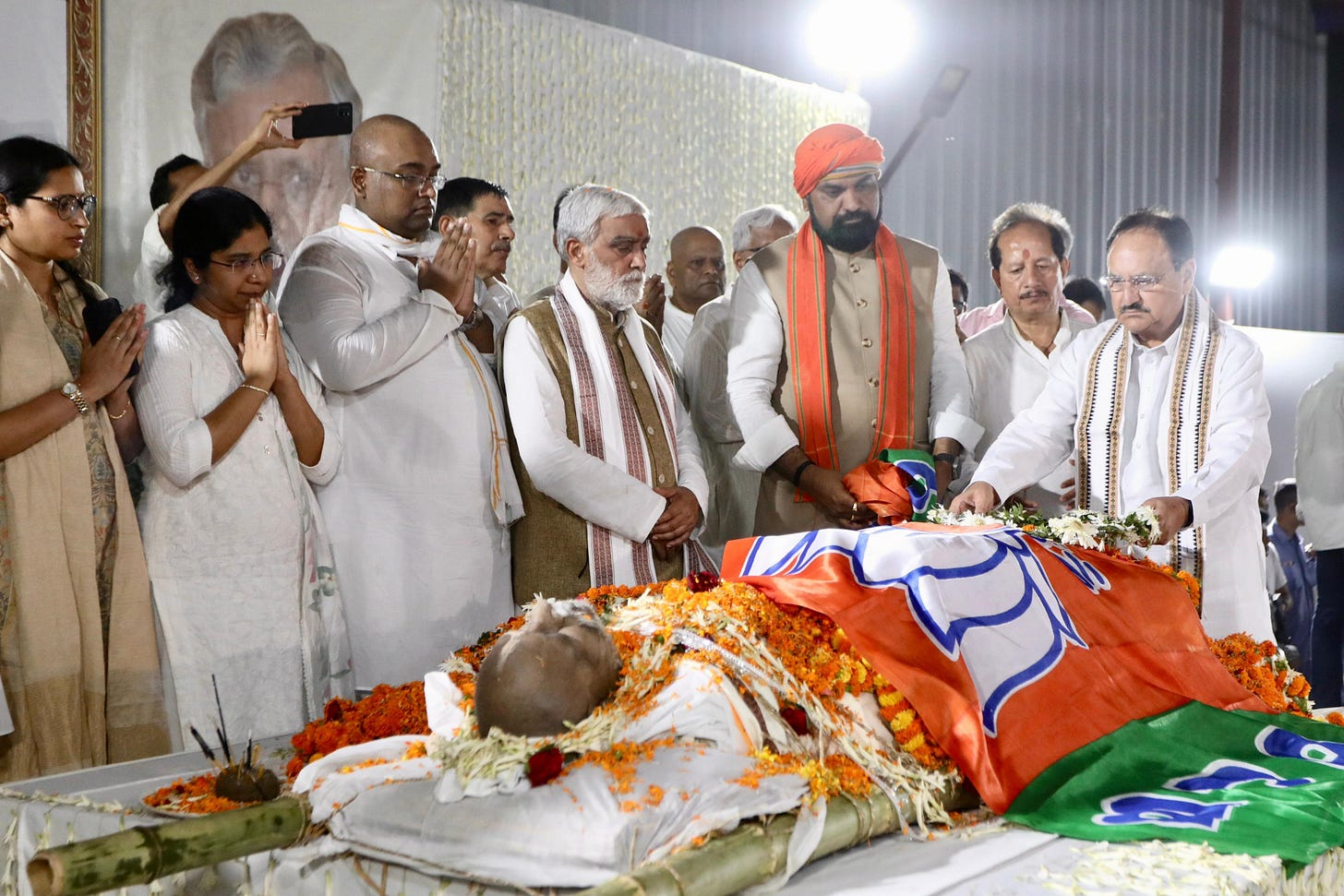Sushil Modi: Bihar’s eternal night watchman who never got to be Chief Minister
Sushil Modi's political career makes you wonder: What if?
Many moons ago, in my indiscriminate youth, I was almost fired for writing a slightly egregious comment in an opinion piece about an election result where I quoted a line from the great philosopher Ramadhir Singh: “Jaise loha loha ko….”
I was simply describing how a politician (a crooner par excellence) vanquished another politician (a master of ensuring dawa-daru) while quoting a line from the greatest movie ever made. Sadly, the editor-in-chief failed to see the humour.
(I avoided the pink slip thanks to a curious twist of fate and accounting and the moral clarity of an individual but that’s a tale for another time.)
Now we all have different favourite moments from that two-part magnum opus.
Some prefer the scene where assassins discuss the culinary versatility of kathal (jackfruit) while recceing their target.
Others prefer the ontological meaning of putting a key where the sun doesn’t shine.
Some love the scene where a Mithun doppelgänger is used to mock the aforementioned philosopher.
Others are partial to the machismo flirting style that can only be employed while taking a bath with a bucket in the great Bihar outdoors and should never be replicated on Tinder.
But scene for scene, most cultists who worship at the altar of Anurag Kashyap will agree that the greatest scene in the movie is the Sonny Corleonesque murder of Sardar Khan in the climax of Gangs of Wasseypur Part 1, where Sardar Khan reiterates his life’s raison d’etere despite Yamraja coming to collect his due.
As auteur Anurag Kashyap explains rationale in a behind-the-scenes video, deconstructing the absurdity of the moment: "Jab sab kuch galat ja raha hai zindagi mein, sab log expect kar rahe hain aadmi ko rona chaiye, par woh roh nahi raha hai... Gaane waala nahi ro raha hai, dunia ro padti hai. (When everything is going wrong, people expect you to cry. But the person singing isn’t crying, the world is crying.)”
In a podcast with ANI, Manoj Tiwari, now a two-time MP – after reminiscing about Manoj Bajpayee and Anurag Kashyap – explained how the song was offered to him in London and became his calling card for life. He jokingly tells Smita Prakash: “The hero is dying, but the song is Jiye tu hazaar saala. Aur superhit ho gaya.”
The Almost King
And, yesterday, I was reminded of another almost Bihar Ka Lala, one who was BJP’s tallest politician in Bihar.
The news of Sushil Kumar Modi’s departure for the Elysian Fields after battling cancer was shocking, and the reaction was a little subdued compared to the large imprint he left on the historic state of Bihar.
Perhaps it had to do with how he lived his political life, without brouhaha and too much fuss, but there’s no doubt that a political titan has passed away.
The oxygen of publicity that was accorded to most of his contemporaries like Lalu Prasad Yadav, Nitish Kumar, Ram Vilas Paswan, and even Sharad Yadav was conspicuous by its absence from his life. The body of reportage, particularly in English – and Bihar was covered with the alacrity of someone reporting from a banana republic in the 90s and noughties – seems to have passed by the man who stood staunchly against the anarchy of misrule that was endemic to the state.
A very fine politician, and by all estimates, an even finer human being left us on Monday. Sushil Modi had a fine finance mind, playing a key role in Bihar’s finances after years of misrule and then rolling out GST as chairman of the state council of finance ministers.
Economist Rathin Roy, certainly no friend of the current dispensation, tweeted after his demise: “... A formidable finance mind, he played a key role in placing Bihar’s finances on an even keel and on GST rollout. We last sparred in 2023 at my post budget talk to MPs at the Constitution club. Glad I was able to pay my respects to him.”
Rahul Roushan, a well-known expert on nothing, wrote on X: “Om Shanti. He might not come across as an aggressive or even charismatic leader to young folks, but it needed balls to stand up to Lalu and talk about his crime and corruption when Lalu raj was at its peak. Sushil Kumar Modi did that. Bihar will be grateful.”
Most of the obits in English about Sushil Modi are bare bones, suggesting that most of the editorial money is being funnelled to brand managers instead of reporters with years of experience.
They mention his time as an MLA, MLC, or his two tenures as Deputy CM.
There’s very little about his educational background except that he graduated in science from Patna Science College and was part of the JP Movement that ballooned into a nationwide campaign in which the next generation of student leaders cut their teeth.
There’s little on his youth days with the RSS.
No paeans are sung about him his role in implementing one of the most complex tax regimes, despite it being called “simple”. There are more articles hailing Lalu Prasad Yadav for revamping the Indian Railways, even though later investigations suggested that he had “inflated cash surpluses by changing account procedures” than on Sushil Modi’s life and times.
Pieces only mention his alliance with Nitish Kumar, his closest comrade outside the BJP, a tag-team partnership that kept Lalu and his proxies out of power for nearly a decade. Perhaps it has something to do with what PM Modi once said about the RSS – a rule he clearly didn’t follow – that RSS karyakartas are taught not to flash their credentials or trumpet their achievements.
The only two decent pieces that I’ve come across are by Dipak Misha in The Print and Amitabh Shrivastava in India Today.
Dipak Mishra’s piece remembers his marriage to Blessy George – a Keralite Christian from Mumbai – where a frugal wedding was toasted with sharbat.
Interestingly, it was at his wedding that Atal Bihari Vajpayee invited Sushil Modi to join the hurly burly of electoral politics where he also marvelled at the diverse backgrounds of the newly weds.
He had said: "The meeting of north and south is taking place. In this inter-state, inter-language, inter-faith marriage, the bride is from Kerala. It is near Kerala that virgin girls have been worshipping for centuries. Pataliputra is associated with Himalaya and Kanyakumari has been watching the tip of Himalaya. This love took place first, then followed the marriage."
Misra’s piece in The Print also goes over his rivalry with Lalu Prasad Yadav, borne in the heat of the JP movement when he accused a young Lalu of misappropriating funds. It would become a lifelong sataygraha that saw him become one of the petitioners in the fodder scam case fomenting the shift in the balance of power from Lalu’s RJD to NDA. It even remembers a Sardar Khan-like sojourn, quoting Modi: “When I became the deputy CM for the first time in 2005 and crossed Lalu ji’s home in my carcade, I got a call from him. “Humko chidhaa rahe ho (are you trying to irritate me)?”
The piece also notes how Modi started the practice of unveiling the economic survey before the budget, and other innovations that are now part of the Budget affair at the Centre and state.
Modi’s first tenure as Deputy CM ended in 2013 when Nitish Kumar – making the first of his flip-flops – took great umbrage at Narendra Modi’s elevation as the NDA Prime Ministerial candidate.
This would lead to his tenure ending the first time till Nitish returned to the NDA fold many times until his erratic behaviour became an example to explain the state of the electron in quantum mechanics to teach beginners Heisenberg’s Effect: where the very act of observing alters the position of the particle (intent of the politician) being observed, making it impossible to predicts its/his/her behaviour.
Either way, Nitish’s cat-like inconsistency meant that Sushil Modi would swap the Opposition benches for the government a few times before he was kicked upstairs (or shunted out, depending upon whose worldview you believe) in 2020.
Modi would be the first one to admit that the key goal was to keep Lalu Prasad Yadav out of power, and that was not something the BJP could do in the early noughties single-handedly.
The piece by Amitabh Shrivastava in India Today recalls: “With a career spanning decades, Modi’s name became synonymous with astute leadership and unwavering dedication to public service. Every Bihar-based bureaucrat you interact with will recall how he was the best-informed politician. Every Bihar journalist will tell you how he was a minefield of information, how approachable he was. His vision as a leader and an administrator, combined with the depth of his understanding, garnered admiration and respect from peers and constituents alike. He was easily the best chief minister Bihar never had.”
The late economist Shaibal Gupta seconded the view, believing that Modi would’ve been an “excellent chief minister,” even though he lacked the charisma of his contemporaries.
But, could Sushil Modi have changed Bihar’s fortunes if he became CM?
Could it become a state whose denizens are more than punching for politicians for other states – particularly enlightened ones south of the Vindhyas – who are casteless and free, but have no trouble abusing poor labourers from Bihar?
Could Bihar have become a state where a large chunk of its workforce – upper class or lower class, upper caste or lower caste – isn’t forced to leave the state to find gainful employment?
The closest we came to answering that question was in 2015, but the combined might of the RJD, JD(U), and Congress was too much for BJP and its allies. However, in the early hours of counting, NDA actually raced ahead, leading to a leading YouTube journalist’s face falling in dismay at the thought of the saffron government winning singlehandedly in his homeland before the RJD, JD(U) and INC combine galloped back on track.
Modi’s demise makes one wonder if BJP let Nitish – who has this time pinkie sworn not to leave NDA – go on for too long.
Couldn’t the BJP put pressure to make Sushil Modi the CM?
Would he have done a Manmohan Singh at a state level, a fine financial operator who becomes adept at handling a government from top to bottom?
Sadly, we will never know.
For too long, the BJP was content to play second fiddle in a state that was crying out for better administration. In his own way, Sushil Modi was an prototype of a garden-variety BJP grassroots worker upon whose shoulders the modern BJP has stood to become the most successful party in the democratic world. It was the countless hours spent accumulating political capital that helped catapult Narendra Modi into a position of unmatched power and popularity today. The last active leader of the Vajpayee era, Sushil Modi will certainly be remembered for the stalwart role he played in trying to reshape Bihar.
But Modi’s inability to become Chief Minister makes one wonder: did he pay the price for our choice of choosing flash over substance?
Did democracy – more suitable for city-states with philosophers than huge nations big enough to be continents – fail him by living up to its tendency to reward charismatic orators over silent and competent administrators?
Did Bihar’s caste equations prevent a “hegemonic” Hindutva that’s pushing us towards a “varna autocracy” (to borrow a delightful term from my friends at The Caravan) to cut through that would have allowed Sushil Modi to become Chief Minister?
Perhaps he could have been the steel that forged a new Bihar, but then again, that’s just wishful thinking. Of course, one shouldn’t forget the role he actually played in the real universe we dwell in. One shudders to think of the tyranny that ruled Bihar if the lantern continued to glow in the state and there had been no Sushil Modi to counter it.
He almost lived by George RR Martin’s epochal lines for the oath in the Night’s Watch in Game of Thrones.
He took a wife, but he wore no crowns and didn’t covet glory. He lived and died at his post, a sword in the darkness, a watcher on the walls, a shield that guarded Bihar against darkness.
Sushil Modi never got the chance to be Bihar Ka Lala as his innings in the state ended in 2020 when he was shunted upstairs to the Centre, but the thought of leaving the party never occurred to him. As he surmised in words: “I would like my body to be covered in a BJP flag.” That’s as good an epitaph as any, epitomising his lifelong committment to the saffron party’s cause.
Also read:
Lalu Prasad Yadav: The anti-Hindutva secular champion who ran out of tricks
Rahul Gandhi: The Prince That Was Promised
Jyoti Basu: Communism’s Cromwell who left a red-stained legacy in West Bengal







